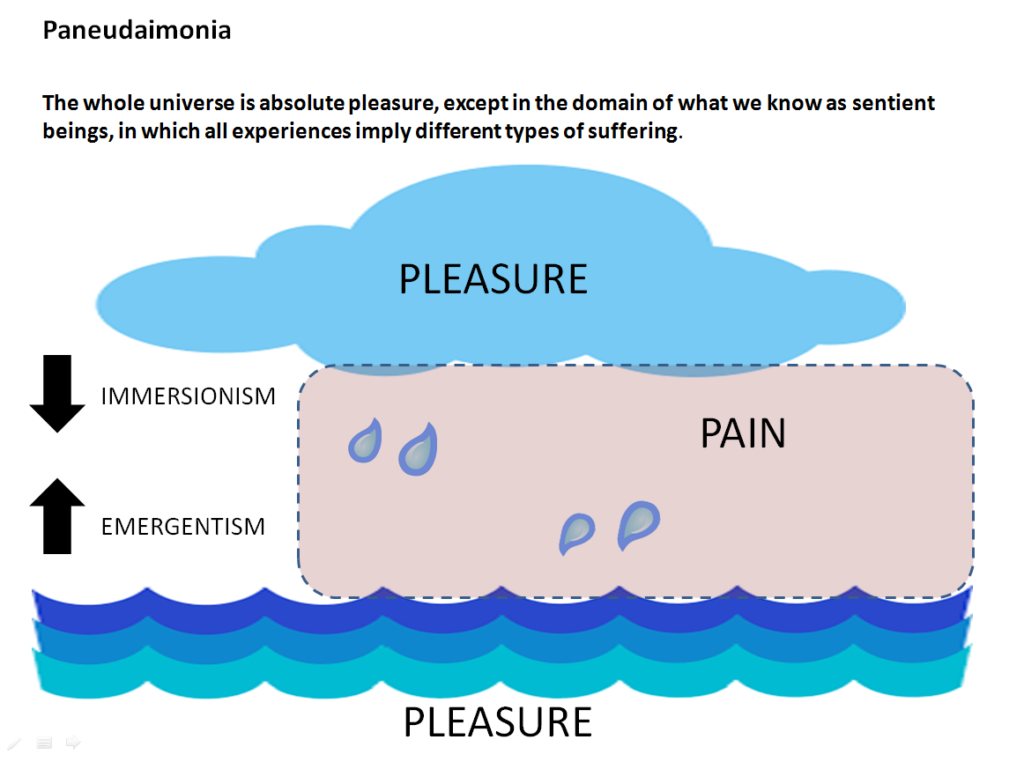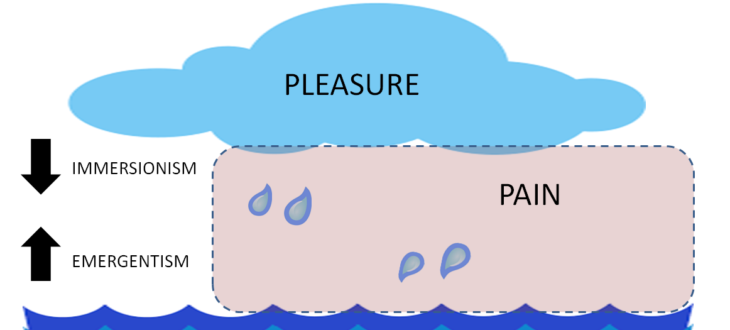What is “Paneudaimonia”[1]?
- Paneudaimonia is the idea that the whole universe is absolute pleasure, except in the domain of what we know as sentient beings, in which all experiences imply different types of suffering.
- Paneudaimonia is the idea that identity, and / or the “I” and / or consciousness are generated and / or are linked to suffering or pain. That is to say, that the self-consciousness is always painful. But the non-conscious experience (the not self-consciousness) is always pleasurable.
- According to the idea “Paneudaimonia”, every time we experience something positive or pleasant, it is because we are losing self or identity; and when we experience the self or the identity, we experience it in a painful way.
Is it compatible with emergentism?
Yes. Paneudaimonia is an idea compatible with materialism, spiritualism, emergentism and immersionism [2].

What does the word “Paneudaimonia” mean?
Pan-Eudaimonia means All-Happiness. The name makes reference to that according to this hypothesis, all the reality is absolute pleasure although with one exception: the subjective conscious reality
What clues or symptoms are from Paneudaimonia?
- “There is no greater pleasure than when the pain goes away”. The experience of feeling great pleasure in pain relief supports the understanding of pleasure as the absence of pain.
- Pleasure and self-consciousness seem incompatible: self-consciousness can impair pleasure, while pleasures seem to be linked to the loss of consciousness and / or individuality.
Could you give examples?
On the one hand, by increasing self-consciousness, pleasure diminishes:
- Certain “physical” pleasures may diminish or even disappear by making them more conscious, such as the pleasure of smoking.
- The same seems to happen with other more “psychological” pleasures. For example, if someone asks us at a party, “How are you doing?” Immediately the act of valuing one’s enjoyment (at least for some people) will have the effect of diminishing the enjoyment. The only reasonable use of the question happens in the undoubtful boring parties (replace “party” by “congress”, “meeting”, “class”, etc.) in a conversation in which “What about the party?” means “What a boring party! Isn’t it? “And “We are having fun” is just ironic or a social expression, and should be translated as “This is soporific!”.
On the other hand, by decreasing consciousness, pleasure increases:
- Loss of self-consciousness produces pleasure. People who faint say that the experience was pleasant. I have also experienced it personally.
- Drugs that reduce self-consciousness produce pleasure.
- The “state of flux” that occurs in activities in which the difficulty progressively adjusts to the skill, as occurs in video games or in a professional career, seems to produce a pleasant absence of self-consciousness.
- The effect of orgasm is known as “La petite mort” , little death.
- The “tantric sexual energy” relates the annulment of the ego with carnal desire and pleasurable states generated.
- Meditation, the loss of the “I”, and the dissolution of the “I” in the “oneness” are related to pleasant experiences.
Which are the implications of this hypothesis in relation to the prevention of suffering?
According to this hypothesis, before birth we lived in a paradise of happiness and that’s where we will return after death. The passage through this world of suffering (which we could literally call Hell) should be as short as possible. If this hypothesis seems possible, this might help us to think twice before dismissing such “extreme” positions as the pro-mortalism [3] defended by Jiwoon Hwang.
Counter-arguments
- The dysphoria produced by depersonalization.
- Seems to be true that people experience more pleasure if they are less self-conscious, but this may be just because they tend to experience embarrassment, worry, and other negative thoughts when they are self-conscious, as if someone (oneself, really) was watching and analyzing them, looking for some defect in them.
- We could train to feel gratitude for the good things we experience, and in this way feel more pleasure just when we are more aware of ourselves. This technique seems to work, at least in some cases.
- Alexey Turchin, argues exactly the opposite: that non-existence is a form of suffering [4].
Acknowledgments
- Brian P. Ellis for the identification of counter-arguments.
- Max Maxwell Brian Carpendale for the identification of counter-arguments.
- Max Maxwell Brian Carpendale for the nuances (and possible oxymoron) regarding the concepts of “unconscious experience” and “self-consciousness”.
- Thanks to Jorge Ortiz for suggesting me include the decrease of consciousness in video games.
- Thanks to Justin Kwong for the suggestion of mentioning this essay by philosopher Peter Zapffe: The_Last_Messiah where he goes into how humans are too well endowed with consciousness and how they attempt to limit their own consciousness.
References
[2] https://manuherran.com/symmetry-between-emergentism-and-immersionism/
[3] http://jiwoonhwang.org/pro-mortalism/
[4] Sarah Lim – “Why non-existence is suffering, and why we shouldn’t accept it as a given” http://transhumanist-party.org/2019/05/24/non-existence-is-suffering/

4 Comments